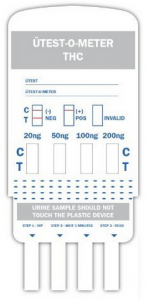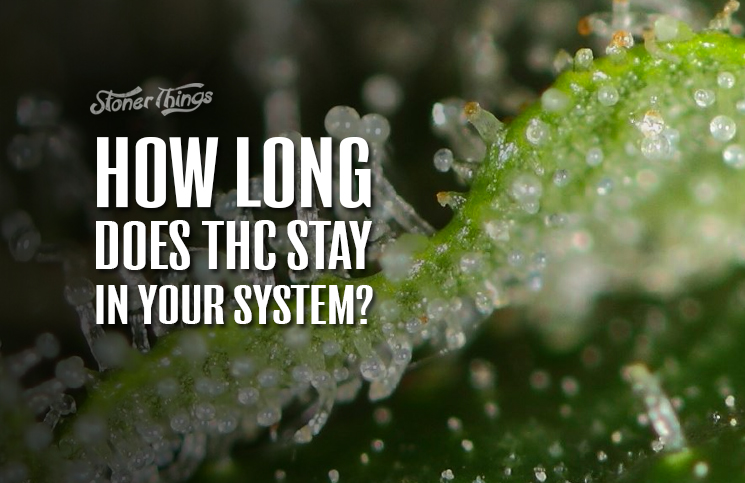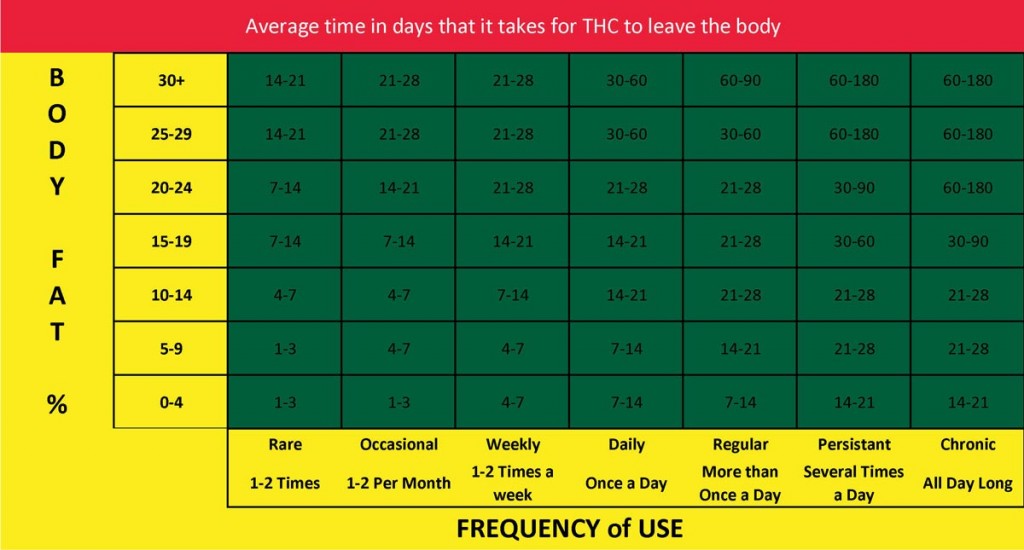Just how long does THC stay in your system? This is the question in the minds of many marijuana users, particularly those who are due to undergo a drug test in the near future.
There is no disputing that THC remains in the system days after the last use of marijuana, of course, but there are a number of factors that can affect how long it does stay in the system. These include the user’s body weight, metabolic rate, frequency of marijuana use, and the amount of marijuana typically consumed, among other factors.
In order to answer the question ‘how long does THC stay in your system’, it might be helpful to know more about the process by which THC is detected. The most common way to test for the presence of THC is via a urinalysis or a urine test. In the United States and many other countries, this test is often administered to potential employees applying for certain positions. Although THC is the primary active ingredient in marijuana, urine tests are actually designed to detect a substance called THC-COOH.
THC-COOH is a THC metabolite that is released by the action of the liver as it breaks down THC. Compared to THC, THC-COOH remains in the system for much longer periods of time. With most urine tests, subjects with a THC-COOH level higher than 50 ng/mL are considered ‘positive’ for marijuana use. Other tests require only 20 ng/mL of THC-COOH in the system in order to merit a positive result, while others require a result as high as 100 ng/mL.
How long does weed stay in your body chart
The amount of time it takes for THC to leave your body depends on both your intake and your body fat ratio. Check out the useful chart below to find out roughly how long it would take for traces of THC to completely exit your system.
Factors that affect how long weed stays in your body
The length of time during which THC can be detected in the system is dependent on factors such as its metabolic rate and half-life, the user’s dosage and frequency of use, and body-fat percentage. In general, the more frequently a person smokes cannabis, and the more he consumes per session, the longer the period of time in which cannabis will be detectable in his system.
A number of THC metabolites have a half-life of about 20 hours, which means that it will take that long before they are completely eliminated from the system. Other compounds have much longer half-lives, remaining in the body’s fat cells for up to 10 or 13 days. The half-life of THC itself is dependent on the user’s weight, and the length, frequency, and volume of use.
How long does THC stay in your urine?
So how long does THC stay in your urine? The only reasonable answer to that question is ‘it depends’. The rate at which THC is metabolized actually varies to a considerable degree from person to person, with some people taking much longer than others to eliminate THC-COOH entirely from their systems. That being said, there are some clues as to how long the chemical remains in the body.
Occasional users – for those who smoke marijuana only occasionally, a urinalysis will likely detect THC-COOH from one to three days after last ingestion. By the end of the fourth day, infrequent users will likely register a THC-COOH level lower than 50 ng/mL. In such people, THC-COOH is unlikely to be detected three or four days after use.
Frequent users – frequent users of marijuana can expect to test positive for THC-COOH up to a week after last ingestion. With such users, 10 days should be sufficient to test negative for THC-COOH, by which time the levels of the chemical should have dropped lower than 50 ng/mL.
Heavy users – with frequent heavy use of marijuana, the period of time in which THC-COOH remains in the system is considerably longer. For such users, even 10 days would not be enough time for THC-COOH to leave the body entirely. In fact, one user who claimed to have used marijuana heavily for more than 10 years was found to have THC-COOH in his urine 67 days after last using marijuana.
How long does THC stay in your blood?
In order to answer the question ‘how long does THC stay in your blood’, it is helpful to know about how the drug is metabolized by the body. Tetrahydrocannabinol or THC – which is the primary active ingredient of marijuana – enters the bloodstream almost immediately after smoking. In contrast, THC enters the system much later if marijuana (typically cooked in food) is eaten.
Interestingly enough, the presence of THC in the blood isn’t that much of an issue, considering that it is detectable only for a few hours at most. Once it has entered the bloodstream, THC is actually metabolized fairly quickly into molecules called metabolites. Scientists have so far identified more than 100 different metabolites formed from THC. These metabolites eventually make their way into the fat cells of the body, and are later eliminated via the normal excretory functions.


For those concerned with the question ‘how long does THC stay in your blood?’, perhaps a much more relevant question to ask is ‘how long does THC stay in your urine?’. In companies with strict anti-drug policies, urine tests are the method of choice for detecting recent drug use.
Over the past few years, a number of products have been introduced that purportedly cleanse the system and help marijuana users beat drug tests. Unfortunately, practically all such products and cleansing methods do little more than dilute the urine or mask the presence of the drug. At present, the only truly reliable way to test negative for marijuana use is to abstain completely for several weeks – or even months – before a test is to take place.
How long does weed stay in your hair?
“How long does weed stay in your hair?” – It may seem like a trivial enough question but it’s important to know when you consider that hair tests are often employed for detecting marijuana use.
Although the majority of states have legalized marijuana in varying forms and degrees (with many more scheduled to follow suit) there are still many states in the U.S. that allow employers to implement drug testing procedures. Given this factor, knowledge about how long marijuana remains in the hair can be very helpful.
It is important to make a distinction between the perceivable mental and physical effects of cannabis and how long the drug remains detectable in the system. Although the effects of marijuana generally fade after a few hours, the primary active ingredient, tetrahydrocannabinol (THC), can be detected in the body for up to several weeks via any one of the many drug-testing procedures commonly implemented by employers and government agencies.
So how long does weed stay in your hair? For most people, THC is detectable in their hair for anywhere from 7 to 10 days from the time of last cannabis use. At the end of this time, the section of the hair typically examined during a drug test will have grown out sufficiently. In most tests, the newest growth of hair measuring 1.5 inches is examined. It usually takes 90 days after last use for the entire hair strand to be entirely free of THC.
Hair tests are among the most commonly implemented testing procedures for determining the presence of THC. They are preferred by some testers due to the ease in which hair can be collected, stored, and transported. Other tests involve the examination of blood, saliva, or urine. Hair tests are typically administered as part of a comprehensive drug testing program.
Hair tests for marijuana involve the examination of the hair shaft rather than the entire hair strand. This reduces the likelihood of contamination. Some testers may opt to collect body hair instead, which grows at a much slower rate than head hair, and will therefore retain traces of THC for much longer periods. The presence of THC in the hair cannot be masked, diluted, or eliminated by using shampoos or bleaches, or by flushing the system out with water.
Using a THC testing kit to be certain
If you want to be certain that all THC has completely left your body, we highly recommend that you use a THC test. Lab Control’s Check Yourself is a test which provides an effective, yet affordable, method for checking that all THC content has left your system.
Check Yourself is a THC drug test kit that allows you to test yourself for four levels of THC: 20ng/ml, 50ng/ml, 100ng/ml and 200ng/ml, letting you get a close approximation of the level of THC in your body.
Using the testing kit is really straightforward. Simply dip the bottom of the device into your urine, wait five minutes, and read the result.
How to get marijuana out of your system
Right from the outset, you should be aware that there are very few reliable ways by which all traces of marijuana use can be eliminated from the body. The primary active ingredient of marijuana – tetrahydrocannabinol or THC – tends to accumulate in the hair, the fat cells, and in the organs – particularly in the liver and kidneys – where it is excreted along with urine. For a frequent heavy user of marijuana, there is little that can be done to avoid THC being detected via a urine, blood, or hair test.
There is an oft-repeated theory that drinking plenty of water in the days leading up to a drug test will effectively help you test negative for the drug. Although it is true that drinking water will help reduce the amount of THC that can be detected in your urine, keep in mind that some of the most accurate drug testing kits can detect even minute quants of THC. Water therapy is simply not a reliable means to test negative for THC, particularly if you have been using marijuana heavily and consistently over the past several months.
You should also avoid attempting to flush out the THC from your urine by drinking plenty of water on the day of the test itself. Most drug test administrations are well aware of this technique by now, and they know that heavily diluted urine is a clear sign that you are trying to avoid detection. In most such cases, testers won’t even bother bringing out the drug testing kit, and will simply mark your urine sample as tampered, and you will likely have to take the test at a future date.














